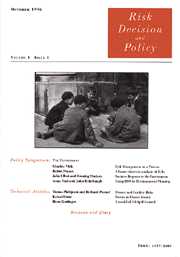Crossref Citations
This article has been cited by the following publications. This list is generated based on data provided by
Crossref.
Abellán, Joaquín
and
Moral, Serafín
2004.
Soft Methodology and Random Information Systems.
p.
157.
Ferson, Scott
and
Hajagos, Janos G.
2004.
Arithmetic with uncertain numbers: rigorous and (often) best possible answers.
Reliability Engineering & System Safety,
Vol. 85,
Issue. 1-3,
p.
135.
Ferson, Scott
Joslyn, Cliff A.
Helton, Jon C.
Oberkampf, William L.
and
Sentz, Kari
2004.
Summary from the epistemic uncertainty workshop: consensus amid diversity.
Reliability Engineering & System Safety,
Vol. 85,
Issue. 1-3,
p.
355.
Cozman, Fabio G.
and
Walley, Peter
2005.
Graphoid properties of epistemic irrelevance and independence.
Annals of Mathematics and Artificial Intelligence,
Vol. 45,
Issue. 1-2,
p.
173.
de Cooman, Gert
and
Troffaes, Matthias C.M.
2005.
Dynamic programming for deterministic discrete-time systems with uncertain gain.
International Journal of Approximate Reasoning,
Vol. 39,
Issue. 2-3,
p.
257.
Moral, Serafín
2005.
Epistemic irrelevance on sets of desirable gambles.
Annals of Mathematics and Artificial Intelligence,
Vol. 45,
Issue. 1-2,
p.
197.
de Cooman, Gert
2005.
Further thoughts on possibilistic previsions: A rejoinder.
Fuzzy Sets and Systems,
Vol. 154,
Issue. 3,
p.
375.
Kriegler, Elmar
and
Held, Hermann
2005.
Utilizing belief functions for the estimation of future climate change.
International Journal of Approximate Reasoning,
Vol. 39,
Issue. 2-3,
p.
185.
Miranda, Enrique
de Cooman, Gert
and
Couso, Inés
2005.
Lower previsions induced by multi-valued mappings.
Journal of Statistical Planning and Inference,
Vol. 133,
Issue. 1,
p.
173.
Cozman, Fabio Gagliardi
2005.
Graphical models for imprecise probabilities.
International Journal of Approximate Reasoning,
Vol. 39,
Issue. 2-3,
p.
167.
Moral, Serafín
2005.
Symbolic and Quantitative Approaches to Reasoning with Uncertainty.
Vol. 3571,
Issue. ,
p.
1.
Cozman, Fabio G.
de Campos, Cassio P.
and
da Rocha, José Carlos F.
2006.
Advances in Artificial Intelligence - IBERAMIA-SBIA 2006.
Vol. 4140,
Issue. ,
p.
612.
Baudrit, C.
Dubois, D.
and
Guyonnet, D.
2006.
Joint Propagation and Exploitation of Probabilistic and Possibilistic Information in Risk Assessment.
IEEE Transactions on Fuzzy Systems,
Vol. 14,
Issue. 5,
p.
593.
Baudrit, C
Dubois, D
Guyonnet, D
and
Fargier, H
2006.
Modern Information Processing.
p.
37.
Dubois, Didier
2006.
Possibility theory and statistical reasoning.
Computational Statistics & Data Analysis,
Vol. 51,
Issue. 1,
p.
47.
Tonon, Fulvio
Bae, Ha-Rok
Grandhi, Ramana V.
and
Pettit, Chris L.
2006.
Using random set theory to calculate reliability bounds for a wing structure.
Structure and Infrastructure Engineering,
Vol. 2,
Issue. 3-4,
p.
191.
de Campos, Cassio Polpo
and
Cozman, Fabio Gagliardi
2007.
Computing lower and upper expectations under epistemic independence.
International Journal of Approximate Reasoning,
Vol. 44,
Issue. 3,
p.
244.
Baudrit, Cédric
Guyonnet, Dominique
and
Dubois, Didier
2007.
Joint propagation of variability and imprecision in assessing the risk of groundwater contamination.
Journal of Contaminant Hydrology,
Vol. 93,
Issue. 1-4,
p.
72.
Baudrit, Cédric
Couso, Inés
and
Dubois, Didier
2007.
Joint propagation of probability and possibility in risk analysis: Towards a formal framework.
International Journal of Approximate Reasoning,
Vol. 45,
Issue. 1,
p.
82.
Miranda, Enrique
and
de Cooman, Gert
2007.
Marginal extension in the theory of coherent lower previsions.
International Journal of Approximate Reasoning,
Vol. 46,
Issue. 1,
p.
188.




